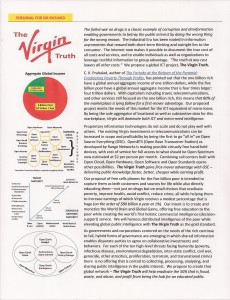
DOCUMENT (1 Page): Virgin Truth 2.6R

DOCUMENT (1 Page): Virgin Truth 2.6R

What Cisco and Dell's Cloupia and Gale acquisitions mean to the future of IT
Art Fewell
NetworkWorld, 20 November 2012
Its been a wild and crazy few years as the last of the client-server era norms clear out and new norms for the cloud era emerge. Last weeks grabs of Cloupia and Gale technologies was a brilliant counter to the increasing power of Microsoft and VMware and provides tremendous insight into the future of IT
EXTRACT:
Since it is that time of year, I will end this on an off-topic note … as we all prepare to take off for the holiday and share in giving thanks with our families, one thing I will be grateful for is the wild success that OPEN has had this year. While we could look back and talk about the cloud and SDN or at the broader economic battles our civilization has faced … what has stood out to me about 2012 is the fact that the largest corporate behemoths in the world all were forced to embrace open technologies and industry landscapes were toppled by the power of open. MITx and Coursera launched massively available online courses giving away the best education in the world freely. We see massive open-source powered clusters driving the economics that today are making it possible to do things like devoting the resources of an entire supercomputer to pediatric cancer patients individually. And while all the change we face can give us a lot of heartburn and stress, I cant imagine anything greater than getting to witness and even take a small part in the amazing possibilities that technology is creating to solve the challenges that humanity faces in this world, and just to be able to live in this amazing time for the growth and evolution of humanity, for this I am truly thankful.

EXTRACT from today's HONG (email only, not online or indexed by intent):
The big news is the emergence of open source search options. Until recently, open source search was not main stream. Today, open source search solutions are main stream. IBM relies on Lucene/Solr for some of its search functions. IBM also owns Web Fountain, STAIRS, iPhrase, Vivisimo, and the SPSS Clementine technology, among others. IBM is interesting because it has used open source search technology to reduce costs and tap into a source of developer talent. Attivio, a company which just raised $42 million in additional venture funding, relies on open source search.
We have completed an analysis of a dozen of the most interesting open source search vendors for a big time consulting firm. What struck the ArnoldIT research team was:
SUBSCRIBE The newsletter is free. You can sign up or send comments to the editor by writing thehonk@yandex.com.
Social Media Intelligence (SOCMINT) – Same Song, New Melody?
Florian Schaurer
Open Source Intelligence Blog, 31 October 2012
Without setting the schmaltzy pride of belated parents aside, David Omand, Jamie Bartlett and Carl Miller – as an online first article in Taylor & Francis’ well-established periodical ‘Intelligence and National Security‘ – are ‘Introducing Social Media Intelligence (SOCMINT)‘. What the world needed, was yet another INT, and here it is. Of course, despite the claim of its authors, SOCMINT is nothing new at all in the OSINT domain, but merely a rebranding of one specific range of its application. Thematically rather related is the United Nations Office on Drugs and Crime’s (UNODC) latest publication ‘The Use of the Internet for Terrorist Purposes‘, also a “first of its kind” according to UNODC (maybe a first for them, but probably not for academia, think tanks, security services etc.). So let’s have a quick look at both.
Read full article, also comments with tool links.
Continue reading “Berto Jongman: Social Media Intelligence (SOCMINT)”
Extreme detail.
Alexis C. Madrigal
The Atlantic, 16 November 2012
EXTRACTS:
. . . . . . . . .
“The real innovation in 2012 is that we had world-class technologists inside a campaign,” Slaby told me. “The traditional technology stuff inside campaigns had not been at the same level.” And yet the technologists, no matter how good they were, brought a different worldview, set of personalities, and expectations.

“This is going to be revolutionary for the developing world”
On Sunday Nov. 11, the president of India, Pranab Mukherjee, will have unveiled the seven-inch Aakash 2 tablet computer Tuli’s company is selling to the government for distribution to 100,000 university students and professors. (If things go well, the government plans to order as many as 5.86 million.) In the meantime, Tuli is deluged with calls from reporters, and every day his company receives thousands of new orders for the commercial version of the Aakash 2. Already, he’s facing a backlog of four million unfulfilled pre-orders.
In developing countries, a $20.00 tablet is going have a profound impact:
Continue reading “Owl: $20 Table Storms the World — Four Million Back Ordered”

While WebRTC is a protocol that allows direct communication between individuals on the internet, using their browser, there is a bottleneck that needs to be resolved. WebRTC does not have a “signaling protocol”, which allows the initial contact, the “handshake” between two computers, to be performed without the assistance of a dedicated server. The trouble is that firewalls are preventing that initial communication from happening. They close your computer within a space that others, on the outside, cannot penetrate. Now there is some important work in progress to establish an open peer-to-peer signaling protocol that will overcome the handshake bottleneck.
More at http://openpeer.org/
 Open Peer is peer-to-peer signalling protocol taking advantages of the IETF advances of firewall penetration techniques for moving media and adds a layer to performs the media signalling in a peer-to-peer fashion but does expect that a minimal requirement of rendezvous servers existing. Beyond the initial rendezvous to get past firewalls, the servers should drop out of the protocol flow and are no longer required. Open Peer was designed with these main goals in mind. There is also a reference here to a previous article about WebRTC
Open Peer is peer-to-peer signalling protocol taking advantages of the IETF advances of firewall penetration techniques for moving media and adds a layer to performs the media signalling in a peer-to-peer fashion but does expect that a minimal requirement of rendezvous servers existing. Beyond the initial rendezvous to get past firewalls, the servers should drop out of the protocol flow and are no longer required. Open Peer was designed with these main goals in mind. There is also a reference here to a previous article about WebRTC
Via Sepp Hasslberger